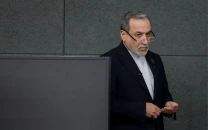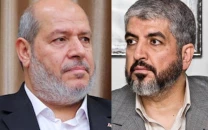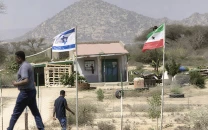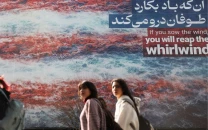Trump visits Dearborn, Michigan, the 'capital' of Arab America ahead of election
Mixed endorsements show Arab Americans’ varied sentiments toward candidates.
1730614976-0/Copy-of-Untitled-(10)1730614976-0-640x480.webp)
In the lead-up to the presidential election, US Vice President Kamala Harris has ramped up outreach to Arab and Muslim Americans, particularly in battleground state Michigan.
However, it is her Republican opponent, former President Donald Trump, who is making notable inroads with this community, which has expressed frustration over President Joe Biden's policies regarding the Israel's war on Gaza and Lebanon.
Gaza and Lebanon have been suffering from the Israeli onslaught in which Tel Aviv has been punishing the populace of both areas under the pretext of fighting Hamas and Hezbollah respectively.
On November 1, Trump visited a cafe in Dearborn, Michigan, known as the Arab capital of America, where nearly 400,000 Arab Americans reside.
Many in this demographic are eager to express their discontent with Harris and the Biden administration's support for Israel.
"We have a great feeling for Lebanon, and I know so many people from Lebanon, the Lebanese people," Trump stated when asked about his visit. "The Muslim population, they're liking Trump, and I've had a good relationship with them. This is it. This is where they are, Dearborn. But we want their votes, and we're looking for their votes, and I think we'll get their votes."
Trump's visit is part of an ongoing effort to engage with the Arab and Muslim community, which has led to endorsements from local leaders. Bill Bazzi, the first Muslim and Arab American mayor of Dearborn Heights, and Amer Ghalib, the Yemeni American mayor of Hamtramck, the only US city with an all-Muslim city council, have both endorsed Trump.
“My meeting with President Trump was positive, and we hope that he can change the current situation,” Ghalib told VOA. “He said he doesn't want wars, and he will listen to our concerns.”
The endorsements from Hamtramck's city council reflect a divided sentiment within the community, as three of the six members have backed Trump while the others support Harris.
Trump himself is an ardent supporter of Israel and its leader Benjamin Netanyahu and has towed the US line of giving cover to Israel's illegal occupation of territories in the Middle East region. His Demcratic rival Kamala Harris on the other hand is perceived by many as an anable of the 'atrocities' commited by the Israeli state.
Israel has been called out for it collective punishement approach against the peoiple of Gaza and is accused of carrying out a genocide in the territory it has kept beseieged for more than a decade.
Council member Mohammed Alsomiri commented, “Harris has answered this question many times that she is going to work with Gaza. She’s going to be fair with people of Gaza. Trump, I don't believe him, and I don't trust him.”
Trump has been actively courting this demographic. During a rally in Novi, a suburb of Detroit, he claimed that Muslim and Arab voters desire an end to endless wars and a return to peace in the Middle East. At that event, he was joined by prominent figures from Michigan’s Muslim community, including Imam Belal Alzuhairi of the Great Mosque of Hamtramck.
“We, as Muslims, stand with President Trump because he promises peace, not war!” said Alzuhairi. This support comes despite Trump's past comments regarding Israel's military actions against Hamas and Hezbollah, where he urged Prime Minister Benjamin Netanyahu to “do what you have to do.”
In contrast, the Harris campaign has been active in engaging with these voters. Following the anniversary of the October 7, 2023, Hamas attack on Israel, a group of 25 Muslim leaders released an open letter urging their communities to support Harris. The campaign states that it has been “working hard” to connect with Arab and Muslim Americans, with Harris meeting small groups of leaders in Detroit and Flint, Michigan, and in Philadelphia, Pennsylvania.
Afghan American Nasrina Bargzie and Egyptian American Brenda Abdelal have been spearheading outreach efforts, meeting with groups across multiple states. However, critics suggest that many of these meetings have been with friendlier groups, lacking genuine attempts to change opinions. James Zogby, president of the Arab American Institute, remarked that recent engagements felt more like a “check the box” effort.
Polls indicate that while support for Trump among Arab Americans is on the rise, it is unlikely to surpass support for Harris. Still, third-party candidates, like Green Party candidate Jill Stein, are seen as potential threats to Harris's support. A recent poll from the Council on American-Islamic Relations showed 29.4% of American Muslims planning to vote for Harris, 29.1% for Stein, and 11.2% for Trump, with over 16% undecided.
As the election approaches, Michigan, with its 16 Electoral College votes, remains a critical battleground. The state was narrowly won by Biden in 2020 and previously by Trump in 2016, illustrating the importance of Arab American voters in this election cycle.
Ronald Stockton, a professor emeritus at the University of Michigan-Dearborn, highlighted the unprecedented polarization within the Arab American community, stating, “There will be permanent scars left behind. Like battlefield scars that remain decades after the war ends.”



















COMMENTS
Comments are moderated and generally will be posted if they are on-topic and not abusive.
For more information, please see our Comments FAQ